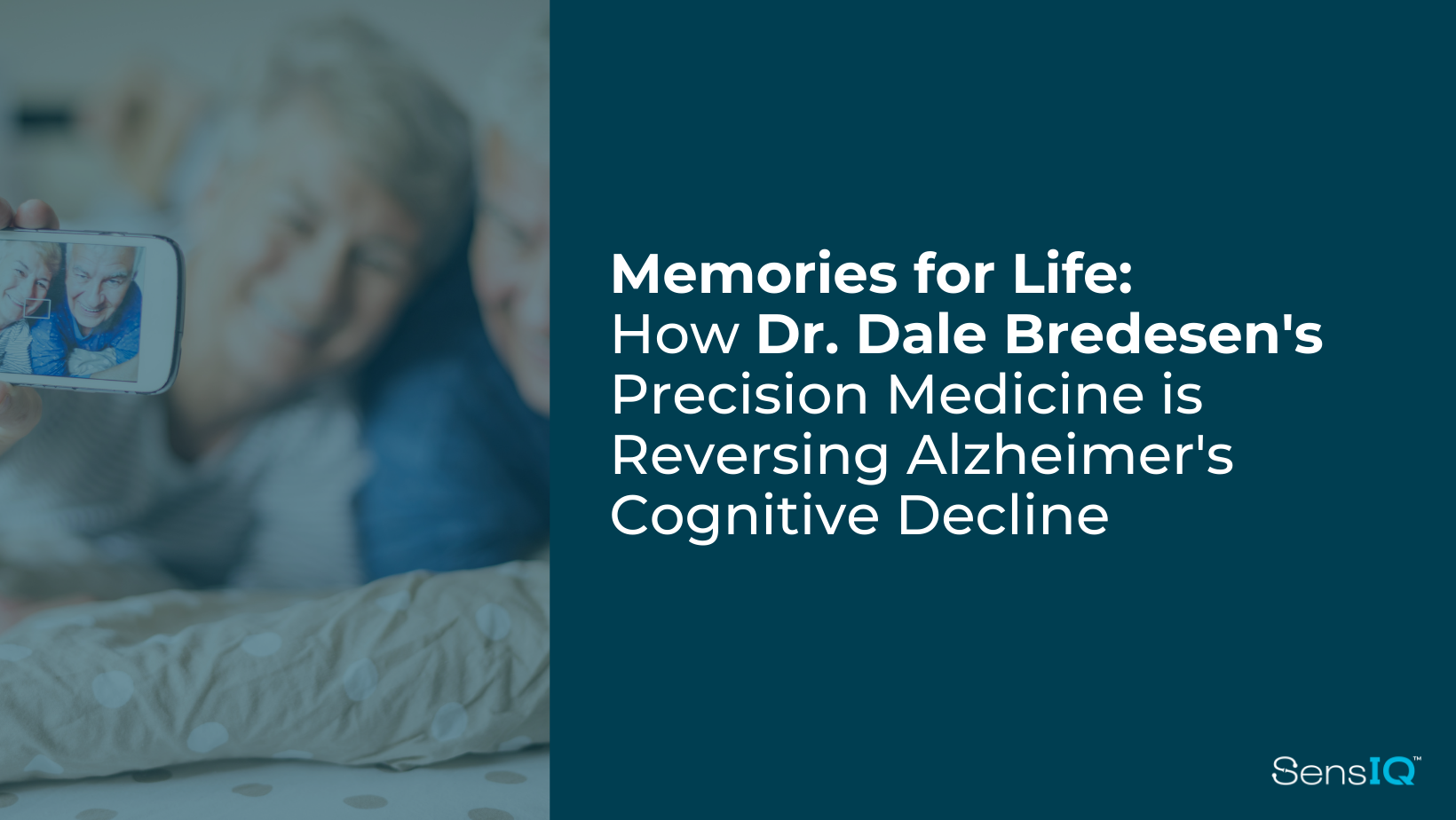Memories for Life: How Dr. Dale Bredesen’s Precision Medicine is Reversing Alzheimer’s Cognitive Decline
In the realm of neurodegenerative diseases, Alzheimer’s remains a formidable challenge, but recent advancements in precision medicine offer a beacon of hope. Dr. Dale Bredesen, a pioneering figure in this field, has developed an innovative therapeutic protocol that promises to reverse Alzheimer’s cognitive decline. The new documentary, “Memories for Life” sheds light on the first patients benefiting from this personalized healthcare approach, highlighting their journey towards regaining lost memories. By leveraging expanded lab data, Bredesen’s methodology crafts individualized treatment plans that address the unique biological underpinnings of each patient. As we delve into the intricacies of this groundbreaking Alzheimer’s breakthrough, we uncover the potential of precision medicine to transform memory care and offer new solutions to caregivers, healthcare professionals, and families alike.
Dr. Dale Bredesen’s Innovative Approach
The Precision Medicine Revolution
In recent years, precision medicine has become a game-changer in treating Alzheimer’s cognitive decline. Dr. Dale Bredesen’s approach exemplifies this shift by focusing on the specific biological mechanisms contributing to the disease. Unlike traditional methods that rely on a single drug, Bredesen’s protocol involves a comprehensive assessment of each patient’s unique metabolic profile. By analyzing expanded lab data, he identifies the various factors driving cognitive decline and devises a personalized therapeutic protocol that addresses these elements. This tailored approach not only targets the symptoms but also seeks to reverse Alzheimer’s cognitive decline by enhancing brain health at a fundamental level. The precision medicine revolution is not just about treatment—it’s about providing hope and effective solutions for Alzheimer’s patients and their families. This innovative strategy highlights the importance of personalized healthcare in the ongoing battle against neurodegenerative diseases.
Personalized Protocols for Alzheimer’s Reversal
Dr. Dale Bredesen’s therapeutic protocol takes a personalized approach to Alzheimer’s reversal by crafting individualized treatment plans for patients. These protocols are based on extensive lab data and metabolic profiling, allowing for a precise understanding of each patient’s biological landscape. This tailored strategy focuses on the diverse contributors to cognitive decline, such as inflammation, hormonal imbalances, and nutrient deficiencies. By addressing these specific factors, the protocol seeks to halt, and potentially reverse, the progression of Alzheimer’s. Patients following Bredesen’s personalized protocols have shown promising improvements, regaining lost memories and cognitive function. This approach underscores the shift towards personalized healthcare, emphasizing that a one-size-fits-all method is suboptimal for complex diseases like Alzheimer’s. By focusing on the root causes of the disease, personalized protocols provide a more effective and hopeful pathway for those affected by neurodegenerative diseases, offering a new horizon in Alzheimer’s care.
Breakthroughs in Cognitive Healthcare
Understanding Neurodegenerative Diseases
Neurodegenerative diseases represent a category of disorders characterized by the progressive degeneration of the nervous system, significantly impacting cognitive and motor functions. Alzheimer’s disease, the most prevalent among these conditions, involves the deterioration of memory and cognitive abilities due to the build-up of amyloid plaques and tau tangles in the brain. Understanding the underlying mechanisms of these diseases is crucial for developing effective treatments. Current research indicates that a combination of genetic, environmental, and lifestyle factors contribute to their onset and progression. This complexity highlights the necessity of a multifaceted approach to treatment, such as the precision medicine strategies pioneered by Dr. Dale Bredesen. By focusing on the individual biological profiles, interventions can be tailored to target the specific pathways driving neurodegeneration. Such breakthroughs in cognitive healthcare offer significant hope for patients and caregivers, pointing toward more effective management and potential reversal of symptoms associated with neurodegenerative diseases.
Recent Alzheimer’s Breakthroughs
Recent breakthroughs in Alzheimer’s research have shifted the focus towards understanding and targeting the disease’s root causes. Innovations in precision medicine, such as Dr. Dale Bredesen’s therapeutic protocol, have highlighted the importance of personalized treatment plans that consider the unique biological makeup of each patient. This approach has shown promise in reversing cognitive decline, a feat once thought impossible. Advances in genetic and metabolic profiling have enabled researchers to identify subtypes of Alzheimer’s, paving the way for more targeted interventions. Furthermore, clinical trials exploring the combined use of multiple therapies are yielding encouraging results, suggesting that a multi-pronged approach may be more effective than single-drug treatments. As these breakthroughs continue to evolve, they offer a renewed sense of hope for patients and their families, signaling a paradigm shift in how Alzheimer’s and other neurodegenerative diseases are understood and treated.
Implementing Memory Care Practices
Therapeutic Protocol in Action
The implementation of Dr. Dale Bredesen’s therapeutic protocol in clinical settings has demonstrated its potential to reverse Alzheimer’s cognitive decline effectively. This protocol is a comprehensive approach that addresses multiple facets of the disease simultaneously. It begins with an extensive metabolic assessment, identifying factors like inflammation, insulin resistance, and nutrient deficiencies that contribute to cognitive decline. Personalized interventions are then crafted, incorporating dietary modifications, exercise regimens, stress management, and specific supplements, tailored to each patient’s unique needs. Healthcare professionals work closely with patients and caregivers to ensure adherence to the protocol, making adjustments as necessary to optimize outcomes. The success stories emerging from this approach provide compelling evidence of its efficacy. Patients have reported significant improvements in memory, cognitive function, and overall quality of life, showcasing the protocol’s transformative impact. As this therapeutic protocol becomes more widely adopted, it offers a beacon of hope for those battling neurodegenerative diseases.
The Future of Personalized Healthcare
The future of personalized healthcare is poised to revolutionize the management of Alzheimer’s and other complex diseases. As we move towards increasingly precise medical interventions, the focus shifts to understanding each patient’s unique genetic, biochemical, and lifestyle factors. This shift allows for tailored treatment plans that target the root causes rather than just alleviating symptoms. In Alzheimer’s care, this personalized approach promises to enhance the effectiveness of interventions, offering improved outcomes and quality of life for patients. Advances in technology, such as artificial intelligence and big data analytics, are facilitating this transition by enabling more accurate diagnosis and tracking of disease progression. As more healthcare providers adopt these personalized methods, the potential for reversing cognitive decline becomes more achievable. The integration of precision medicine into mainstream practice represents a significant step forward in transforming memory care and offers hope to millions of patients and their families.


